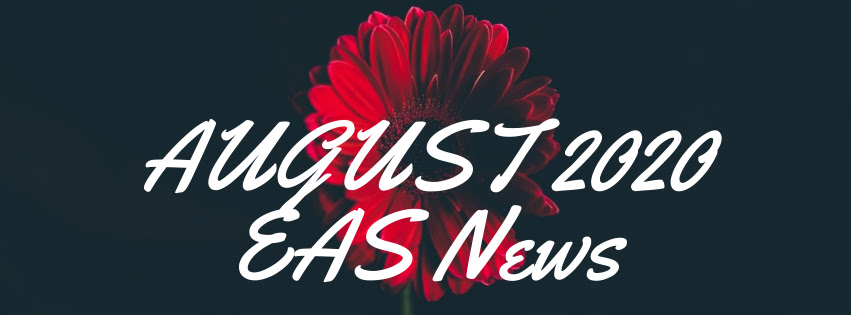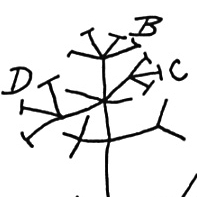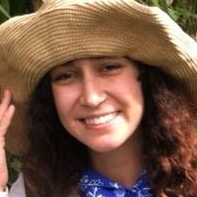EAS Quarterly Newsletter

Report from the Presidents
EAS Members,
First and foremost, we hope that this email finds all of you in good health. This has been a challenging few months for all of us, with no end in sight. As such, I imagine EAS news is probably far from your thoughts, but we wanted to mention a few key updates that take us into planning for the next year.
As you all know by now, the 2020 AAA meeting in St. Louis has been canceled. Individual abstracts and sessions that were submitted last spring will automatically be forwarded to next year’s program committee, where the final round of decisions will be made. That means if you submitted an abstract or session proposal for the 2020 meeting, they will automatically repopulate when the call for papers goes out for the 2021 meeting, so you don’t have to resubmit.
While the in-person meeting has been canceled, the AAA will convene in the fall as a virtual event with the theme of Raising Our Voices. This is by design intended to be a new venue given that a live meeting cannot be held until 2021, and is focused on collaboration and conversation rather than presentation style data delivery. There are two types of submissions: Live Stream, which have a limited offering of 160 sessions (4 back-to-back sessions, 4 time slots a day, for 10 days), and View-On-Demand submissions, which include different kinds of venues and will be unlimited. If you are interested in putting together a virtual session or roundtable discussion, the deadline for submission to this new program is August 25th, and you will use the same platform to submit as the regular meeting.
We are particularly interested in hosting sessions that are either focused on (a) topics related to race, equity, justice and representation in the evolutionary social sciences, or (b) topics related to conducting and maintaining research from afar during COVID times.
With the cancellation of most meetings this year, and possibly well into 2021, conversations about potentially moving EAS away from AAA have stalled. If AAPA (soon to be AABA) occurs in 2021 we look forward to having an informal presence there, as we had planned for the LA meeting, and moving forward with discussions on details of a potential move with their executive committee. Right now the call for papers for AAPA is up, with an October 15th deadline.
We hope that all of you stay safe and healthy this summer and wish you the best of luck with whatever transitions lie ahead of you at your universities.
Brooke Scelza, President
Karen Kramer, President-Elect
Mary Shenk, Past President
Events
AAA Raising Our Voices (Session & Roundtables) Deadline August 25th, 2020
AAPA call for abstracts, deadline October 15th, 2020
Bioant Talks Youtube Conferences: AnthroEthics in the 21st Century (09/28-10/02) and AnthroEvolution Material Cultural (10/05-10/09). More information can be found here
Recruitment
Post-doc opportunity with Melanie Martin at The University of Washington in Biological Anthropology (priority given to applications already received by August 15th).
Recent Member Publications
Beyond the Household: Caribbean Families and Biocultural Models of Alloparenting By: Robin Nelson
The formal demography of kinship II: Multistate models, parity, and sibship By: Hal Caswell
Why understanding multiplex social network structuring processes will help us better understand the evolution of human behavior By: Curtis Atkisson Piotr J. Górski Matthew O. Jackson Janusz A. Hołyst Raissa M. D’Souza
Global WEIRDing: transitions in wild plant knowledge and treatment preferences in Congo hunter–gatherers By: Gul Deniz Salali , Mark Dyble, Nikhil Chaudhary, Gaurav Sikka, Inez Derkx, Sarai M. Keestra, Daniel Smith, James Thompson, Lucio Vinicius and Andrea Bamberg Migliano
Women’s socioeconomic position in ontogeny is associated with improved immune function and lower stress, but not with height By: Anna Rubika, Severi Luoto, Tatjana Krama, Giedrius Trakimas, Markus J. Rantala, Fhionna R. Moore, Ilona Skrinda, Didzis Elferts, Ronalds Krams, Jorge Contreras-Garduño & Indrikis A. Krams
Fitness-maximizers employ pessimistic probability weighting for decisions under risk By: Michael Holton Price and James Holland Jones
Other Media
There is a new website for The Evolutionary Genetics of Humans & Other Primates Journal Club
Evolving Minds: Learning as Evolution, Evolution as Learning By: Dustin Eirdosh & Susan Hanisch

